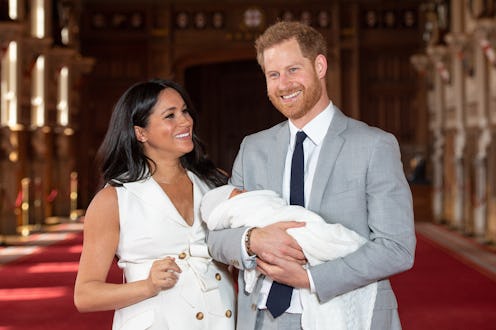Entertainment
Here's Why Prince Harry & Meghan's Baby Won't Be Called "Prince"... At Least Not Yet

Hear ye, hear ye! The royal baby's name has finally been announced, and it's both unique *and* pretty unexpected. The Duke and Duchess of Sussex recently revealed that he'll be called Archie Harrison Mountbatten-Windsor, but guess what? He's not, in fact, a prince. So, does Archie have a royal title at all then? Well, according to Emily Andrews, a royal correspondent for The Sun, Harry and Meghan have opted out of using the traditional, "courtesy title" for their newborn son.
On May 8, Andrews tweeted that, "Harry & Meghan have chosen not to use courtesy titles [such as Harry’s Scottish title Earl of Dumbarton] so it’ll be Master Archie Harrison Mountbatten-Windsor. When Charles is King he’ll automatically become Prince Archie, but he [or his parents] may choose not to use it."
The whole topic of royal titles is more than a little complicated. In a nutshell, though, most members of the royal family are considered "peers of the realm." According to Debrett's — the 250-year-old company that's considered to be like, *the* authority on British etiquette — a "peer of the realm holds one (or more) of five possible titles [duke, marquess, earl, viscount, baron] inherited from a direct ancestor or bestowed upon him by the monarch."
Both Prince William and Harry automatically became princes upon their birth, as is customary for sons whose parent or grandparent is or was the King or Queen of England, according to Nobility.co.uk. On the days of William and Harry's respective weddings, they were each given two additional titles: Earl and Duke. Duke is the the highest peerage, and refers to their British ancestry, while Earl signifies their Scottish standing.
All of Prince William's three children automatically inherited the titles Prince and Princess upon their births, due to the fact that they're descendants of the eldest son of the Prince of Wales, aka Prince Charles. Up until 2013, this titular honor was only bestowed upon male heirs, but Queen Elizabeth flipped the script shortly before Princess Charlotte's birth.
Since Harry is *not* the eldest son of Charles, though, his and Meghan's children would be allowed "courtesy titles" of Lord or Lady. So, Archie could have been called Lord Archie Harrison Mountbatten-Windsor, but the new parents opted to forgo that title — perhaps to instill a relative sense of normalcy in the kid? They have yet to actually explain their reasoning.
Anyway, as Andrews' tweet noted, after Queen Elizabeth abdicates the throne, Archie's title will automatically change to "Prince," because his grandfather, Prince Charles, will then become the King of England. And per the customs previously outlined, that's how it works with grandchildren of kings or queens.
Make sense? Told you this whole title thing was complicated. To reiterate, by the way, yes — this was the *nutshell* explanation.
Regardless of Archie's title, though, he'll still get to enjoy plenty of royal perks — so, no need to feel bad for the little guy. More importantly than the perks, he'll undoubtedly be very well-loved by his entire family and pretty much the entire world.